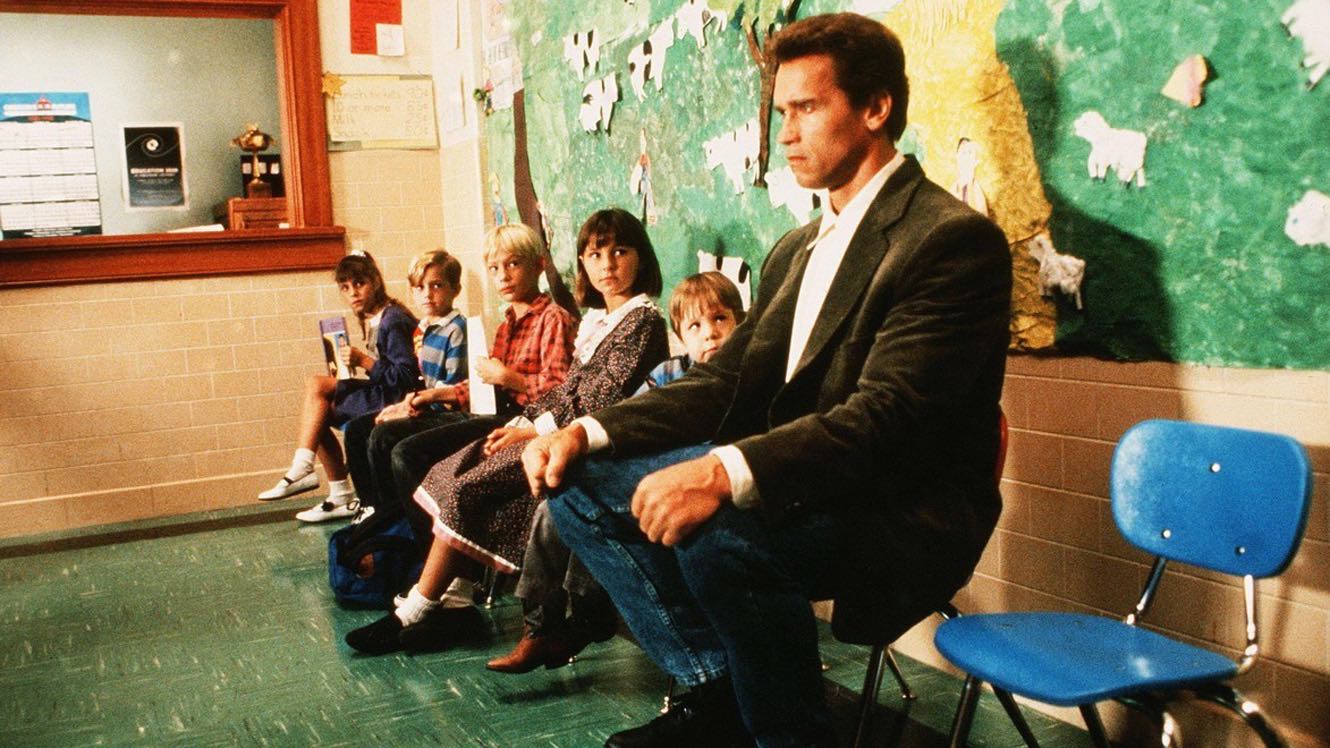“Boys have a penis. Girls have a vagina.” “It’s not a tumor.” “I’m the party pooper.” “Who is your daddy, and what does he do?” Yes, Kindergarten Cop, Arnold Schwarzenegger’s first sincere stab at family-friendly comedy after the hit adult-ish lark Twins in 1988 (both directed by Ivan Reitman), is, true to the actor’s style, chockablock with lines now embedded in our cultural consciousness and delivered with delightful, unadorned innocence from the mouths of babes and with megawatt star aplomb by Arnold, who’s never been more sincere—or at least so deft at portraying the appearance of sincerity. With him, you never know.
His amped-up ’80s movies, engorged with the excesses of the Reagan era, are mostly verbally terse, physically kinetic works, with catch phrases instead of conversation. A god of cinema superstardom, a foreign-born, American-made myth, he’s had no shortage of one-liners, often lame but always delivered with gusto—one can’t help but think about how a man who’s never shaken his thick accent can be a master of the English language (I only half sarcastically wonder what Pound would think of “Hasta la vista, baby”). As Umberto Eco wrote, “If metaphors require an underlying cultural framework, then the hieroglyphic language of the gods cannot be a merely primitive stage of human consciousness: it needs the presence of both the symbolic language of heroes and the epistolary language of me as its starting point.” Does this incredibly esoteric diagnosis not fit the Austrian Oak? A herculean hero speaking in quotes designed to become part of our lexicon? Lines that, torn from context, take on the air of metaphor? What is a meme if not a modern metaphor?
Aside from these ineffaceable lines, though, the rest of Kindergarten Cop hasn’t been remembered kindly by professional critics nor everyday moviegoers despite the film’s $200 million box office success. Well, Kino Lorber, a distributor of rarefied, respectable cinema (Tsai Ming-liang) as well as underappreciated genre stuff (Suspect Zero), has, inexplicably and wonderfully, released the film in 4K, and I’m here to tell you that, if taken for what it is and not what we may want from a classic Arnold movie, Kindergarten Cop is endlessly charming entertainment.
Arnold is given more dialogue than ever, most of which he has to say affably, like a real human. And he’s excellent—he’s genuinely moving as a macho man with tenderness hidden under all those muscles while acting alongside (and even using as props) kids. He displays more adroit comedic timing and timbre than he gets credit for. Conan the Barbarian as a shepherd of children who are not yet jaded by life’s misfortunes, the Terminator as a teacher of tykes, the great killer of bad guys doing cute—it’s an almost surreal concept made human and modest by Reitman, who six years earlier altered the DNA of Hollywood comedy with his big-budget special effects extravaganza Ghostbusters.
Conan the Barbarian as a shepherd of children who are not yet jaded by life’s misfortunes, the Terminator as a teacher of tykes, the great killer of bad guys doing cute—it’s an almost surreal concept.
Arnold is John Kimble, a cool, lone-wolf cop in dogged pursuit of Cullen Crisp (Richard Tyson), a dealer, killer, and mama’s boy trying to find his ex-wife in the verdant thrush of the Pacific Northwest, a comely little town with families and a quaint little main street. There’s also money involved—a lot of money. But Crisp is actually after his son, who’s been in hiding with his mom since he was a toddler and no longer remembers his father. Cullen’s mother (Carroll Baker) is even scarier, a sociopath dressed like a stuffy woman of means, hair done up at a salon held high like a man-made structure, who wants her grandson and will do anything to get him back. Kimble is partnered with Phoebe (Pamela Reed, very good), who was previously a teacher, and will go undercover to ascertain which child is Crisp’s. However, she gets the stomach flu, so Kimble shaves and steps in. He meets Crisp’s ex-wife (Penelope Ann Miller) and falls in love, so we get to see the cinematic titan of testosterone try romance for the first time. It works.
The film isn’t flashy, and not even always interesting-looking, but it’s an efficient, actor-centric aesthetic, and Reitman does pull off some nice moves, aided by Taxi Driver/Raging Bull cinematographer Michael Chapman. I’m thinking of that smooth, somehow ominous sideways pan going rightward across the facade of the school, all those pleasantly painted bricks and windows through which bright sunshine pours, finally arriving to its ultimate subject: Cullen Crisp talking sweetly with the principal about his jack-of-all prodigal son, whom he doesn’t know. The photography of Astoria, Oregon is gorgeous—the green ruptures of trees and thick, well-groomed grass; quaint buildings lining the streets prowled by placid drivers; and, though filmed 20 miles south, the beautiful corrugation of the Pacific, blue waves under blue sky.
But the film works because of Arnold in a role more radical than you’d think, convincingly transitioning from shotgun-slinging tough, to flummoxed fake teacher utterly incapable of controlling the kiddies (the Predator was an easier adversary), to softie who comes to love his new job (and the kids) and who finds solace in small-town domesticity (he does get to punch an abusive father in the face, too). Six years earlier, Arnold was shooting up police stations; not long after he would turn one of cinema’s menacing, undeterrable villains into a kindly protector of a child. And then do it again the next year in Terminator 2. FL









